Guardians of the Galaxy Vol. 2 begins with one of the first movie’s trademark groovy 1970s songs, “Brandy (You’re a Fine Girl)” by Looking Glass, as we pan into an idyllic forest scene in 1980. A man and a woman drive past a Dairy Queen and go into the woods, and we realize we’re meeting Peter “Starlord” Quill’s father, played by a digitally-facelifted Kurt Russell. It’s comforting, friendly—until we go inside the strange flower that Peter’s dad has planted, and we see glimpses of some biological monstrosity, as the music echoes. This sequence is our first clue that the mystery of Starlord’s paternity will have turn out to have an ugly resolution.
Warning: Enormous spoilers for Guardians of the Galaxy Vol. 2 ahead.
The word “family” is spoken a few times in this sequel to Marvel’s enormously popular 2014 space opera, in a way that’s intended to let us know that it has thematic significance. But the real over-arching theme of Guardians 2 is fathers—and more specifically, evil patriarchs. Peter’s father, Ego, turns out to be a narcissistic psycho who wants to spread his genetic code all over the universe—basically, turning everything into more of himself. Meanwhile, the conflict between two alien sisters, Gamora (Zoe Saldana) and Nebula (Karen Gillan), is resolved when they realize they were both abused by their adoptive father, Thanos.
Ego and Grant
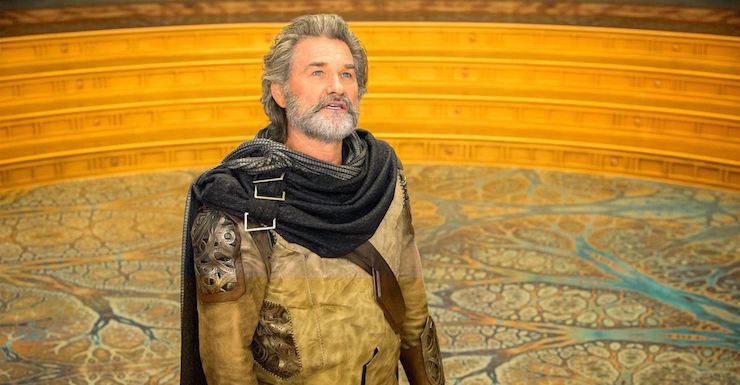
Ego, whom comics fans will know as Ego the Living Planet, appears at first to be a classic hippie dad, full of remorse at leaving his son behind and eager to make amends. He’s sentimental about his old romance with Peter’s mom, Meredith, and full of hokey stories about how he wanted to walk among other life forms after millions of years as a self-aware planet. It’s only after a nice dayglo father-son game of catch that the yuckiness appears, and it starts with that Looking Glass song: Ego explains that just like the singer in “Brandy,” he had to leave the woman he loved, because his true love is the sea.
Or rather, Ego’s true love is his own psychedelic polymorphic life-energy, which he wants to use to turn the entire universe into an extension of himself. He’s killed all his other children when they turned out not to have inherited his control over this energy, but Peter (Chris Pratt) is his true son. This is only because he can help with Ego’s project of becoming the ultimate patriarch and, essentially, fathering an entire universe. Ego wants to squirt his seeds all over creation, and infuse everything with his DNA, but he needs his son’s help to do it. Too bad about all the people Peter loves, who’ll have to die in the process.
The figure of the evil dude who wants to turn everything into an extension of himself is a familiar one in writer-director James Gunn’s work. His earlier film Slither (2006) features an abusive husband Grant (Michael Rooker, who plays Yondu here) who terrorizes his much younger wife, Starla (Elizabeth Banks). Starla wants to break free, but Grant gets infected with an alien parasite, which allows him to impregnate another woman, Brenda, with millions of his half-alien children. These slug-babies then infect other people, all of whom speak with Grant’s voice, parroting whatever Grant says. Soon, the entire town becomes part of Grant, except for Starla and her childhood crush Bill (Nathan Fillion).
Slither plays like an elaborate metaphor for the way that an abusive relationship can feel as though it shuts out the rest of the world, with loads and loads of grotesque body horror.
Meanwhile, Ego’s fatherhood isn’t just gross, it’s actually cancerous. His attempt to colonize the entire universe is represented by huge dark growths that spread everywhere, consuming all living matter. And to drive the metaphor home, we learn that Ego gave Starlord’s mother the brain tumor that killed her, so he wouldn’t feel tempted to keep coming back to her and become diverted from his purpose of reproducing himself endlessly.
Yondu: Father of the Year?
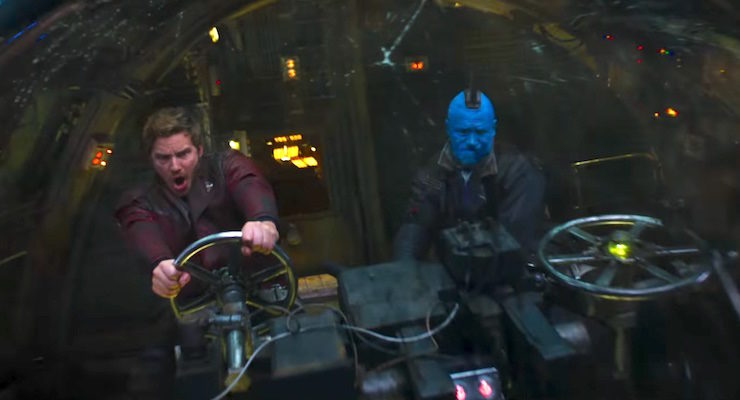
The story ends up by offering us a hopeful alternative as Peter’s father: Yondu, who kidnapped Peter from Earth as a child and kept him instead of delivering him to Ego. Yondu basically raised Peter. And he was a terrible daddy who kept threatening to eat his “son”—but he also sacrificed for Peter, and taught him to fight. (And yet Peter believes the stories Yondu told, that he was just kept around because he was tiny, and thus useful for thievin’.)
After the literally poisonous, exploitative version of fatherhood we’ve seen from Ego, Yondu starts to look like a candidate for Father of the Year, especially after he gives his life for Peter’s.
Yondu, meanwhile, has his own daddy issues, because he’s been rejected by Stakar Ogord (Sylvester Stallone), who rescued Yondu from slavery among the Kree and made him a Ravager. Stakar is clearly the closest thing that Yondu has to a father, and when Stakar disowns him for breaking the Ravager code, he’s heartbroken. This is what sets off the brutal leadership battle among Yondu’s Ravager crew, after Yondu’s not willing to sacrifice Peter in turn, to get back on his feet.
The other huge arc in the film is the Nebula/Gamora battle, which continues from the first film. They were both raised by Thanos, that sadistic purple dude who sits on an armchair, floating in space. Thanos forced them to fight each other every day, and the loser (who was always Nebula) had to be cut up and cybernetically enhanced each time. It’s a nightmarishly extreme story of parental abuse, which has left both women at each other’s throats. They’re only able to start communicating, as sisters, when they put the blame where it belongs: on Daddy Dearest.
Even then, they can’t agree what to do about Thanos. Nebula, who suffered the most, wants to go kill the Mad Titan. But Gamora, who came out healthier both emotionally and physically, believes that’s impossible, and just wants to move on with her life.
We do meet one apparent matriarchy in the film: the Sovereign, led by high priestess Ayesha. But they’re really a eugenics cult, who have rejected the whole concept of parenthood and family in favor of some kind of sterile Brave New World-style engineering. By the end of the movie, Ayesha is in trouble, and she’s abandoned all pretense of creating a perfect society, in favor of engineering the ultimate weapon: Adam Warlock.
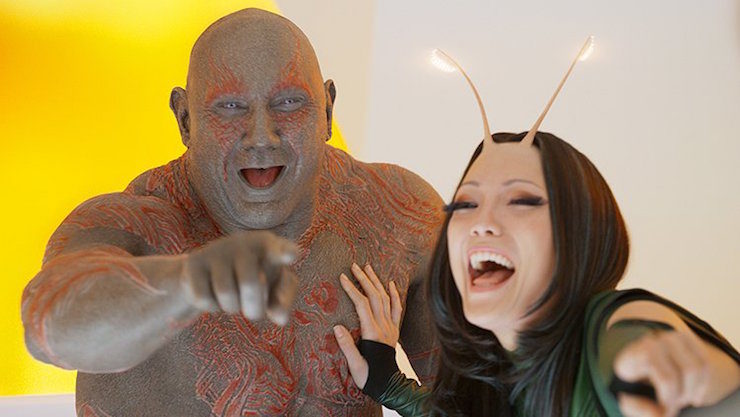
The real counterpoint to all the evil and inadequate fathers in the movie, though, is Drax the Destroyer (Dave Bautista). In the first movie, Drax’s grief over the deaths of his wife and daughter made him into a homicidal maniac—but now he appears to have made peace with his loss. Until we see the empath, Mantis, touch Drax as he thinks of his family, and she bursts into tears. It’s a small moment, but it’s intensely moving because Drax just sits there, head bowed.
Drax, unexpectedly, becomes the steady heart of the team, and you never doubt for a second that he was a good husband and father. When he’s not shrieking with laughter and making poop jokes, Drax has a quiet fatherly stoicism. And by the end of the film, he seems to be turning into a warped kind of surrogate father for Mantis, an orphan who was raised alone with Ego. (Even though, yes, he keeps telling Mantis that she’s ugly. Shades of Yondu’s parenting.)
Raising Baby Groot
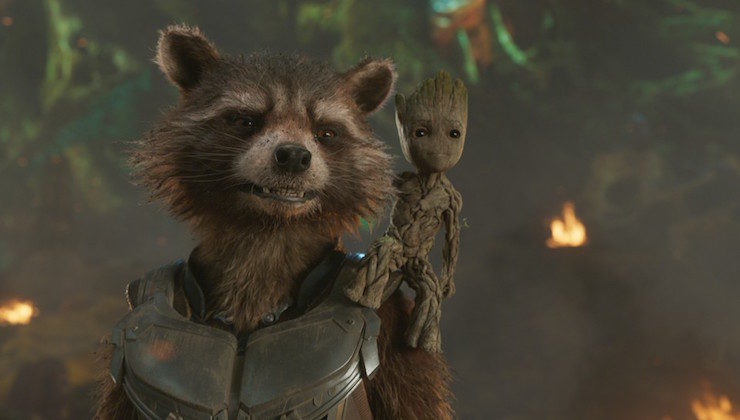
Which brings us back to the theme of family—Drax is one of the main people who insists that’s what the Guardians are. And in a universe populated by narcissistic dads (Ego), sadistic dads (Thanos), rejecting dads (Stakar) and societies that have rejected the concept of parenting altogether (the Sovereign), the Guardians make for an appealingly bizarre sort of family unit. They all act like both kids and parents at different times, and their bond comes from not just watching each other’s backs, but also caring about each other.
They’re the ultimate expression of the 1990s “family we chose” idea: people who stay together because they want to be together, not just because of birth or bonds of marriage.
And they have a baby to raise, whom they all take turns looking after: Groot. Groot is sort of a mischievous toddler, not quite smart enough to be of much use, but a giant distraction. At the end of the film, he does prove useful at getting into small spaces that an adult can’t crawl through (the same benefit that Yondu keeps claiming he kept Peter around for.) Seeing the almost indestructible fighting machine from the first movie transformed into a teeny, yawning, squalling infant plays on your protective instincts. And even though you might expect Rocket to be Groot’s main parent, they really do share parenting duties among themselves, handing him off in the middle of a space battle.
Whose Tunes?
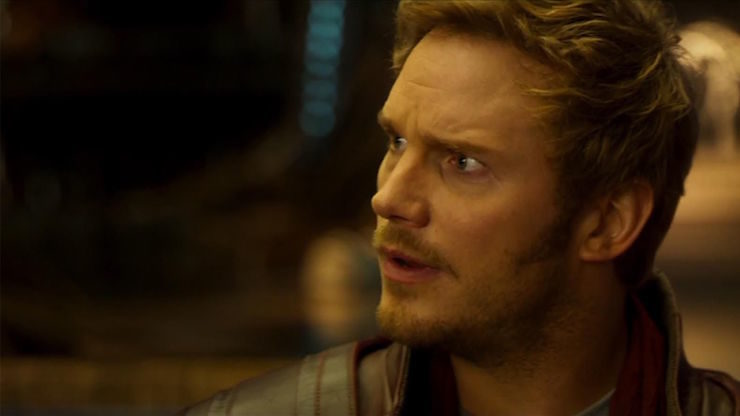
That Looking Glass song, “Brandy (You’re a Fine Girl)” keeps coming back throughout this movie, and it gets creepier every time. It’s a seriously ugly song: an offshoot of the mostly undistinguished genre of “I’m a rock musician who needs to love ’em and leave ’em, time to go, bye” songs that ruled the 1970s. You don’t realize just how gross the lyrics are, until Kurt Russell recites them, emphasizing the condescension of “What a good wife you would be.” It’s stomach-churning.
In the first Guardians, classic rock and pop mostly belonged to Peter Quill. They served as a reminder of Peter’s dead mother and lost innocence, and reflected his emotional state at every turn. This time around, though, 1960s pop and 1970s MOR belong to everybody: Groot, Rocket, and even Yondu make use of Peter’s tunes for their own dance scenes and killing sprees. But the movie still plays with our lingering expectation that the nostalgic songbook is a window into Peter’s soul—which is what makes the twist of the knife with “Brandy” so effective, when we realize the song isn’t what Peter thinks it is.
Peter also loses ownership of his old-school music, just as he’s having to learn to understand the people around him, particularly Rocket and Yondu. He also has to grow up, by choosing his family over the father-son reunion he’s dreamed about. It’s fitting that the film’s soundtrack begins serving the needs of other people, as well as reflecting a more complex inner landscape for Peter, at the very moment that he has to perform that quintessential coming-of-age action: killing his own father.
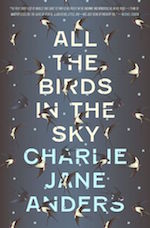 Before writing fiction full-time, Charlie Jane Anders was for many years an editor of the extraordinarily popular science fiction and fantasy site io9.com. Her debut novel, the mainstream Choir Boy, won the 2006 Lambda Literary Award and was shortlisted for the Edmund White Award. Her Tor.com story “Six Months, Three Days” won the 2013 Hugo Award and was optioned for television. Her debut SFF novel All the Birds in the Sky, has been shortlisted for the 2016 Nebula Award in the Novel category and earned praise from, among others, Michael Chabon, Lev Grossman, and Karen Joy Fowler. She has also had fiction published by McSweeney’s, Lightspeed, and ZYZZYVA. Her journalism has appeared in Salon, theWall Street Journal, Mother Jones, and many other outlets.
Before writing fiction full-time, Charlie Jane Anders was for many years an editor of the extraordinarily popular science fiction and fantasy site io9.com. Her debut novel, the mainstream Choir Boy, won the 2006 Lambda Literary Award and was shortlisted for the Edmund White Award. Her Tor.com story “Six Months, Three Days” won the 2013 Hugo Award and was optioned for television. Her debut SFF novel All the Birds in the Sky, has been shortlisted for the 2016 Nebula Award in the Novel category and earned praise from, among others, Michael Chabon, Lev Grossman, and Karen Joy Fowler. She has also had fiction published by McSweeney’s, Lightspeed, and ZYZZYVA. Her journalism has appeared in Salon, theWall Street Journal, Mother Jones, and many other outlets.










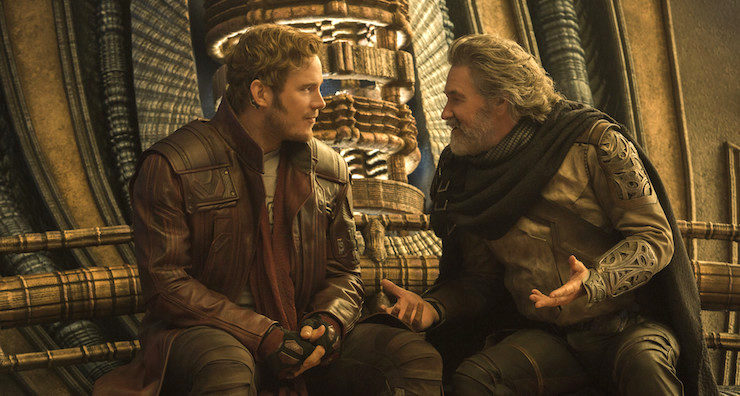
‘Brandy’ is creepy? Saying she’s a wonderful woman and life with her would be terrific is creepy? Granted my advice to Brandy would be forget the guy whose first love is the sea and find somebody else. But creepy?
I just read this having watched the movie – I enjoyed it, but now I feel like I need to go back and see it again. Great perspective (and yeah, the final Brandy reference was chilling).
I guess a woman staying fixated on a man who’s made it clear he isn’t available is kind of creepy. As I recall the song Brandy has a whole bar full of guys ready to ditch the sea for her. Play the field, girl!
Interestingly enough, Yondu would be in any other setting one hell of a bad father and the reasons would be, precisely, toxic masculinity. As the leader of a band of basically space pirates, he had to find a way to sell his “fatherhood” of Peter to all, including himself, as more or less abuse.
And he gets a satisfying arc because in the end, he recognizes that, he is regretful of his life (he says he never did anything right), and wants to at least do something coming absolutely clean, transparent – saving Peter because he loves his kid and doesnt have to hide it anymore to conform to any other idiot view of what he should be.
Wait, killing one’s father is a quintessential coming of age action? Uh, I’ll have to agree to disagree on that one.
As long as we’re spoiling, did anyone else catch the horrible horrible horrible CGI young Kurt Russel at the beginning of the movie? Geez, it made Rogue One’s Tarkin look like a masterpiece.
What do you mean, did anybody else catch it? It’s it’s like the first 5 minutes of the movie and it’s obvious. But it’s not terrible at all it’s quite well done CGI. You probably wouldn’t notice it if you didn’t know that Kurt Russell was in his sixties and didn’t remember what he looked like when he was 25. It was as good if not better than the Robert Downey jr. CGI From Civil War. Which I loved because they had his Weird Science Saturday Night Live era eyeliner.
@@@@@ 5: Killing you own father IS the quintessential coming of age action for every man. Most of us do it metaphorically, by disagreeing with him and going our own way because “the old man does not understand” when we’re young, though many of us reconcile later on. Rejecting your father and his authority is the clearest way to make it clear you no longer see yourself as a child.
In fiction, especially genre fiction, the killing you own father thing tends to be a bit more literal. Ask any Skywalker. Or King Arthur, for that matter.
Funnily enough, considering all of the cgi comments in this thread, I’ve read in a few places that Kurt Russell’s long time makeup artist actually did most of the de-aging effect!
Grant in SLITHER was not a perfect man, possibly not even a good one, but I would argue that he wasn’t abusive before being taken over by an alien force; he wasn’t even meant to be abusive by the movie.
This is a somewhat older guy who married a much younger woman he took care of, who mistook her feelings of gratitude toward him for love. We first meet them at a point in their marriage when she is beginning to realize that she has never been attracted to him. After she rebuffs his sexual overtures again, after what appears to be months, he expresses anger and tells her that she’s never in the mood, but does not threaten her, does not attempt to force her, just shows his frustration and leaves. Later, when another woman offers herself to him, he says no, he’s married to a perfectly fine woman and he wants to be faithful to her.
By the next morning, when he returns to her a host for a parasitic alien force, his wife says she realizes that she has bee ignoring him of late, and that she’s going to make more an effort.
What I get from all this — and yes, I know this is a man’s point of view — is that he may have been married to the wrong woman and he may have been in the act of realizing it, and his wife may have had to suppress her yuck factor, but clearly, he wasn’t abusing her; he was just a guy she had had the poor sense to marry, a guy who meant well and was beginning to realize this wasn’t enough. Not a bad guy at all, I think, just one who comes off as worse because he was played by Michael Rooker.
Excellent recap and analysis. One of the issues the first Guardian’s movie had was that it had a poorly written villain, in my opinion. Lee Pace just didn’t seem to have much to work with; he was just sort of a generic “I’m EVIL!” type of character to me. Ego made a good villain because 1. He wasn’t presented as such initially, even though it was kind of obvious that he was the big bad of the film. 2. He had a gregarious and interesting personality. He felt like the kind of guy who was really fun to hang out with, have a beer with, talk about music with, etc. That, of course, was basically a lure to get Peter into position, but it was a damned effective one. (Kudos to Kurt Russell!) 3. Ego didn’t think of himself as evil. That, I always feel, is essential to creating a well crafted villain. Another good one was Loki. He didn’t think of himself as evil, he just had a massive inferiority complex which he compensated for in extraordinarily bad ways. Ego, well, as you say, a complete and utter narcissist incapable of understanding that what he sees as good is only seen that way by him and him alone. It’s possible that he might have actually thought he loved Peter, but it’s pretty clear that if Peter hadn’t been able to do the power light thingy, Ego would have added Peter to his embarrassingly large collection of progeny skulls. Even then, he wouldn’t regard that as evil because his need to achieve his goals transcends any moral considerations about who would suffer along the way.
Let’s hope that the makers of Avengers: Infinity War understand the lessons that this movie has to offer about how to write a good villain with their treatment of Thanos. If he’s another version of Ronan, it’ll be a huge disappointment to me.
Parenting…IN SPACE!!!
@9 Young Kurt Russell was indeed mainly achieved through makeup (he has his own makeup guy who he’s used for decades, and so is really good at changing up his looks: see http://www.vanityfair.com/hollywood/2017/05/marvel-guardians-of-the-galaxy-vol-2-kurt-russell)
Try actually looking up the full lyrics to Brandy instead of taking one or two lines out of context like Ego did. I can’t see anything creepy at all about a guy being completely and totally honest with a woman that he can’t stay with her and her pining for him anyway. Sad perhaps but not creepy.
That being said, yeah there are some super creepy songs that sound like sweet love songs from that era. I wish I could remember it but I do remember there was a 70s “Love” song that played every day where I worked. When I actually listened to the lyrics, it made me kinda want to puke or track down the songwriter and beat the crap out of him. He beat the woman he was singing about in the song.
Of course there are plenty of songs from other era’s the same way. The 80s had Every Breath You Take for instance.
@13 At least Sting knew exactly he was saying and was horrified when people started playing it at weddings and proms.
Now if they’d wanted a really sick and creepy “love” song they should have used
“Escape (the Pina Colada Song)”. That’s as despicable as it gets.
You’re doing the ’70s wrong. You don’t analyze lyrics sober, man. Just sing along…
@10: Thank you. For a moment I thought I had seen a different film. Granted (see what I did here?) it’s been years since I saw Slither, but as far as I remember Grant was exactly whhat you describe, a not-particularly-bad, not-particularly-good man that made an ill-judged decision regarding a woman he fell in love to. Nothing else, and hardly anyone who deserves the adjective “abusive”.
@14 Isn’t Escape the song about two people who become disinterested with each other, then reconnect through attempted infidelity enabled by a personals column ad?
I don’t know that it is creepy exactly. More like a poster child of communication being key to successful relationships.
#17
I just listened to the song. You’re right. Not sure what’s creepy or despicable about it. It’s the kind of a innocuous plot twist you’d find in a romantic comedy starring Meg Ryan or Julia Roberts.
I haven’t seen the movie yet, and you make it sound like such a horrible nightmare of evil fathers that I’m not sure I want to! Our hero’s Dad wants to squirt his dna over the universe and make it over into his own image, and the son has to kill him. Damn. I’m not sure even baby Groot could cheer me up after that.
This article does a good job of taking all the various sub-currents and themes that were lurking underneath the action and making sense of them.
I am in awe of what they did with Ego. In the comics, he was more of a MacGuffin than a character. And I couldn’t see how they could make that work in a film. But the movie created a character who in every way lives up to the name Ego. Selfish even to the point where he doesn’t want his son to share his creation–he just needs to use him to make it happen.
Don’t you all know that everything is “creepy” now? Just in the last half hour I’ve seen the word applied to masks, dolls, CGI characters, wild animals, and cross-generational romances. (And of course when things aren’t specifically “creepy,” they’re “nightmare fuel.”)
How do we get out of bed and make our way, beset as we are with the howling fantods?
Also, the de-aged Kurt Russell is pretty amazingly well done.
Everything is in the eye of the beholder and through whatever lens they want to see things through right now. “Hey, I’m thinking of growing a beard.” “That’s toxic masculinity!” (this was a real exchange I had once) I mean, when it comes to Brandy, what would you rather have, a man who stayed and regretted it and resents his family for causing him to leave behind his calling, or someone who was honest enough to say that he would be unhappy in the long run? And besides, “what a good wife you would be” *could* have been in response to HER asking HIM about marriage in the first place, or even outright proposing, if we want to consider the true feminist possibility. If anyone reads this comment before it probably gets “moderated” off the site, I’ve noticed that while the writing is usually very high quality, the politics of the authors do get in way a lot more often than they dont, and I think that’s unfortunate.
Yondu’s dying act (using the jetpack and spacesuit) is like parenting boiled down to it’s most essential elements: get your kid out of any life threatening danger, boost them up high enough to see the wider universe, insulate them against the cold, cold void and then say, “Sorry kiddo, I did my best. Gotta die now.”
I never read “Brandy” the way it was used in the movie; to me, it was always the story of a woman who had an unrequited love for someone who liked her, but not that way, and did his best to dissuade her.
Now that the movie’s presented this interpretation, I can see it… I still don’t really agree with it, but I can see it. It doesn’t hurt that the movie did such a hideously wonderful deconstruction of the ‘love ’em and leave ’em’ character.
At least two science fiction writers have written short stories based on the song “Brandy.” Joan Vinge’s first published short story “Tin Soldier” and she also claims that around the same time George R. R. Martin also wrote a short story based on the song. I have a copy of Vinge story in a collection of her short stories but I could never find Martin’s story.
Thanks for this great review. I considered “Brandy” creepy when it was originally released, so I’m glad to find others who agree. I very much enjoyed this movie and its exploration of ideas about families and parenting, especially the Nebula/Gamora plot thread. I’d love to see more of this if they could do more talking and less pounding each other. There’s also an interesting thread about brotherhood: Yondu’s analysis of Rocket, as well as Drax’ interactions with Peter. Otherwise, things were pretty grim on the brotherhood front, as Yondu and his crew’s mutiny lead to the killing of all the crew but one, and the Ravagers like Yondu just fine once he’s dead, and doesn’t know about it.
And Jason, it looks a little silly to find somebody worrying about their comment disappearing four days after it was posted.
Once again, in terms of the number of movie theaters in North America and the number of films currently out, saying that the particular movie is a pure misnomer. More actual human beings in the United States alone saw the the “Who Shot J.R.?” episode of Dallas or the “Chuckles the Clown” episode of the Mary Tyler Moore show. More actual humans have seen (and will see) the final, first run presentation of the mini-series Roots than will likely have been first-run ticket purchasers to the film referenced by the OP.
My point, and yes there is one, is that this site (and others like it) should stop pretending that a large swath of the population has had a shared experience when a Disney, Marvel, Star Wars or similar ‘blockbuster’ has been released and, particularly, stop suggesting, much less stating that the following (XYZ) cultural, societal, psychological or other such meaning can be applied to or from it.
Now, kindly remove remove all body parts from my lawn.